- How Much Weight Can You Realistically Lose in 3 Months? - January 14, 2024
- How To Lose 1kg a Week (Guaranteed) - August 20, 2023
- How To Count Calories (or Estimate) and Stay on Track When Eating Out at Restaurants - July 25, 2023
For some people, the benefits of muscle gain are clear and obvious, and they’ll stop at nothing to gain as much muscle, as quickly as possible (i.e. use steroids).
Steroids can dramatically increase the amount of muscle you can gain, and the speed at which you can gain it, but I’m too scared to try it, and frankly I don’t really see the point, given that I’m not getting paid to gain or maintain muscle.
If you are taking steroids, or are planning to, this article probably isn’t for you because you’ll likely be able to add more muscle in a month than I did in a year.
For everyone else, read on…
Let’s get this out the way first; gaining muscle naturally is a VERY long and gruelling process. You really need to be in it for the long game, and from month to month, almost dupe yourself into the mindset that you don’t care if you gain muscle or not, because you sure as hell won’t see tangible results over the course of weeks or months.
You simply need to keep banging the workouts in, week in, week out, make sure you’re utilising progressive overload, and make sure you’re in a small calorie surplus. Oh, and pray.
There are a few scenarios where muscle growth might be a bit quicker;
You have great genetics
Was your dad an Olympic weightlifter, or naturally gifted athlete in some other sport? If so your genetics are probably pretty good and you’ve got a huge advantage over everyone else. You’ll probably have a level of muscle mass without even training, and when you DO train, you’ll be able to gain more muscle, at a faster rate than the average person. Lucky you.
You’re brand new to the gym
If you’ve never trained before, and you start lifting, you can put on muscle mass very very quickly. This is because your body will react to the novel stimulus placed upon it. This can happen even if your nutrition isn’t on point.
You’re eating A LOT
There is absolutely a limit to the amount of muscle you can gain naturally over a given time period, however if you’re ensuring that you’re definitely providing enough calories for your body to grow new muscle, you will maximise this potential more so than if you were to eat conservatively in an attempt to minimise fat gain.
The problem is, eating way over your calorie requirements can create the perception that you’re building more muscle than you actually are, because the layer of fat covering your muscles will get thicker too. This isn’t necessarily an issue, but most people will likely reach a point where the fat covering their chest and stomach gets to an unacceptable level and they get pissed off, start dieting to lose the fat and compromise any progress they may have been making with muscle gain.

HOW TO DO IT PROPERLY
The bulk/cut mentality is rife in the bodybuilding world, and while it might work for professionals competing in Mr Olympia on tons of gear, it’s far less likely to work for Phil, 37 from Stockport who trains twice a week.
My view is that everyone should try and get as lean as they can (Without compromising their health) just once. From that point, you can simply slowly build muscle, eat in a slight surplus, and generally enjoy training and your life without having to do a ‘cut’ every few months because your ‘bulk’ made you too fat.
There are many different ways to describe this training philosophy; some call it ‘lean gains’, referring to the benefits of building muscle while staying lean, others might refer to it as body recomposition, i.e. the process of staying the same (or a similar weight), but altering the ratios of muscle and fat that you hold (i.e., more muscle and less fat).
Trust me, it’s a much nicer way to manage your training and nutrition.
The downsides? `It’s boring. You need to be comfortable with the fact that your physique isn’t going to change much in short periods of time. Bulking can be fun and motivating because you get to eat a bit more, and you start filling out your Large T-shirts fairly quickly, even if part of the reason for that is some fat gain.
By the way, if you’re a beginner and you want a free workout plan, I’ve put on together below which I’ll email you for free;
FREE 3 DAY-A-WEEK WORKOUT PLAN
SO HOW MUCH DID I GAIN IN ONE YEAR?
My aim was to gain 5kg of muscle in a year, while keeping fat gain to an absolute minimum.
I did pretty much exactly that (well 5kg of weight at least), going from ~75kg in January 2019 to ~80kg in January 2020.
I picked 5kg as a target because it gave me scope to build a noticeable amount of muscle, and it was a big enough number to be able to track progress on a monthly basis (5kg over 12 months is 0.4kg per month or just under 1b per month).
Anything less than that would have been pretty difficult to track since weight can fluctuate so wildly from day to day.
Now, 5kg is probably quite ambitious, especially since I’ve been training for over ten years (how many of those I’ve been training ‘properly’ is up for debate).
Why is it ambitious?
WHAT DOES THE EVIDENCE SAY?
Studies on the speed of muscle growth are hard to come by, but here are a couple I picked out;
This study compared low and high-frequency training across 19 participants and found that average muscle mass increase was almost bang on 1kg across 8 weeks. Extrapolated across a year, this means that they could hope to gain 7kg in 12 months. Not bad, BUT the average training age of the group was only 4 years.
This study looked at 56 individuals (It’s unclear what their training ages were) performing a 5 days a week resistance training plan for a 12 week period. There were wild variations in lean mass gain across high and low responders (the top and bottom 15% of subjects based on lean mass gains).
This shows that low responders gained an average of 1kg across 12 weeks, while high responders gained an average of 4.5kg over 12 weeks, this means in a year, low responders could hope to gain a total of 4kg while high responders might be looking at a total 18kg.
As we can see, numbers across the two studies (and even within the second study) vary wildly.
The other thing to consider, this that the higher your training age (the number of years you’ve been training), the less potential you have to gain more muscle. The more you train and the stronger you become, the closer to your genetic potential you’ll get, and the rate of muscle growth will slow.
Lyle MacDonald goes into more detail on this, setting out how much muscle he believes people can gain based on their lifting experience;
In the first year, a muscular gain of 10-12 lbs might be realistic. This would fall to 5-6 lbs in the second year, 2-3 lbs in the third year and would be minimal beyond that. This would give the average female the potential to gain perhaps 17-21 lbs of total muscle over a career of lifting.
MacDonald, 2009

Taking all this into account, and looking the averages, 1-2kg seems like a realistic target for an experienced lifter like myself.
The bottom line is, if you spend all your time researching and planning rather than training you won’t gain any muscle AND you need to make your target big enough for you to at least be able to track your progress (if you only aimed to build 1kg in a year, that would equate to to 0.08kg per month; VERY difficult to track when you consider that weight can fluctuate by multiple Kgs in a DAY), so I picked 5kg for the target.
WHAT DID I DO?
I trained on average 4.5 times per week, using full-body workouts consisting of 13 sets each.
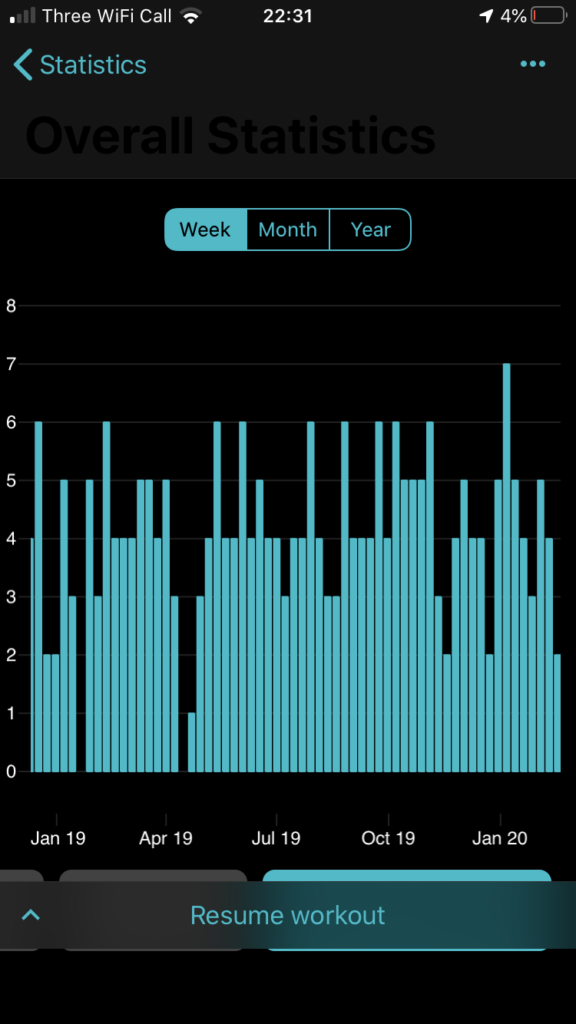
I made sure that the total volume load was increasing over time, only through increasing a combination of weight and reps (extra sets were only occasionally utilised).
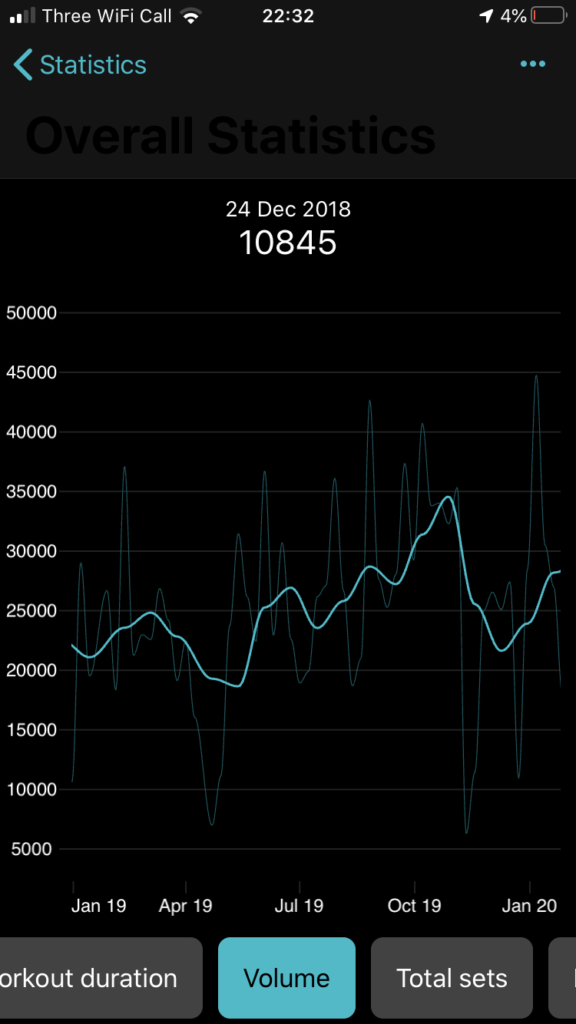
I also aimed to gain 5kg of weight (with the assumption that the increase in volume load and adequate protein in my diet would mean that most of this was muscle).
I actually ended up gaining 4kg.
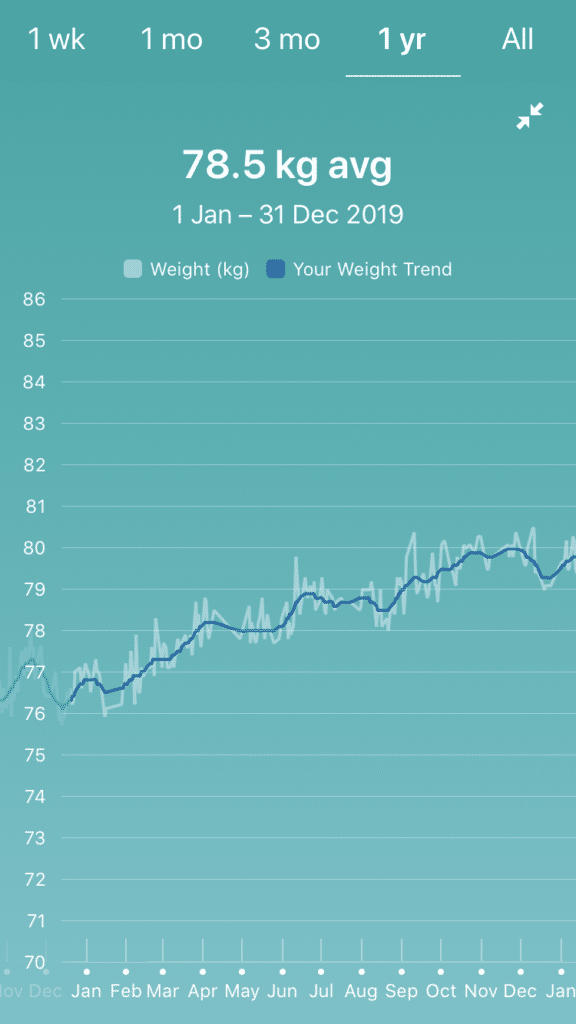
I didn’t track calories, I just made sure I was hitting my target protein numbers and getting in enough carbs to give me enough energy to train.
WHAT WERE THE RESULTS
I tried to get similar shots (i.e same position, same lighting etc) approximately one year apart; left is January 2019, right is January 2020.
While the fact that I gained 4kg is indisputable, it’s very difficult to say how much of that was muscle and how much was fat. One of the most accurate ways to get a read of your bodyfat vs lean mass ratio is with a Dexa scan; these are really expensive and inconvenient, and I just didn’t care enough to get one
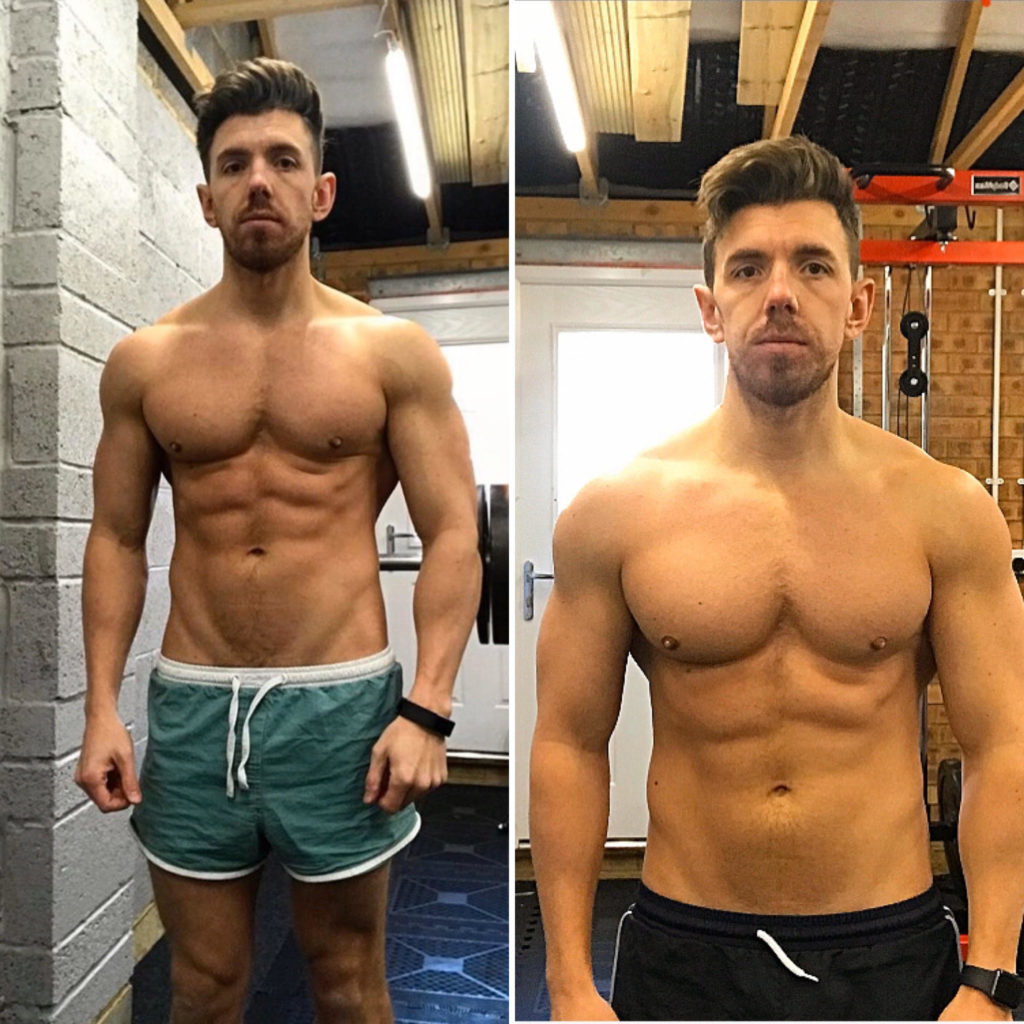
Eyeballing it, it doesn’t look like I gained much muscle at all, although it’s clear to see that I gained some fat.
My clothes are tighter, but again that could just be fat.
Also this is just one angle, I should have taken multiple shots from the back/side etc.
The short answer is I haven’t got a clue how much actual muscle I gained, I’d estimate around 2kg if you put a gun to my head (please don’t do that).
WAS IT A SUCCESSFUL TRAINING YEAR?
Definitely; volume load increased dramatically, which is never a bad thing, particularly when there was no increase in sets.
Because I’m 4kg heavier, I can also eat more than I could at 76kg without gaining weight (because metabolism increases as weight increases).
I’m also still happy with my body fat levels, which means I can carry on doing this for another year.
HOW CAN YOU SPEED UP MUSCLE GROWTH?
You can definitely speed up the rate of muscle growth in two ways;
- Eat more. While there will always be a limit on how quickly can you physically grow muscle, if you ensure you’re in a substantial calorie surplus, this will mean you can rest assured that you’re definitley taking in enough calories to fully take advantage of all the growth potential at your disposal. I could have eaten more and possibly gained a bit more muscle over a year, but I would have also added more fat, which I didn’t want. If all you’re worried about is muscle gain, and fat gain isn’t a concern, eat ad libitum.
2. Use PEDs (Steriods). I don’t know a lot about steroids so I can’t tell you what and how much to take, but I do know that you’ll be able to grow much more muscle and at a much faster rate by using PEDs
SHOULD YOU DO THE SAME?
If your goal is to build muscle while minimsing fat gain, you should definitely follow this method; i.e. pick a muscle gain goal – the longer you’ve been training, the lower this goal should be. I’ll probably aim for another 2-3kg this year, but if you’ve only been training for a couple of years and are very lean; 5-7kg might be a good goal.
You should definitely track your volume load and try to creep it up slowly over time.
You should also track your weight everyday.
SUMMARY
If you thought rapid muscle gain was possible without roids, I’m sorry to disapoint you.
The reality is that muscle gain is a very slow, boring process that you can’t really take any short cuts with.
Sure, you can gain weight rapidly (which might get you a bit more muscle), but a lot of it will be fat that you’ll just have to diet off again.
There is something to say for slow and steady muscle gain, it means you’ll never be in state where you’re unhappy with your body fat levels, and there’s no pressure to to eat when you’re not hungry.
REFRENCES
Increasing Lean Mass and Strength: A Comparison of High Frequency Strength Training to Lower Frequency Strength Training: https://www.ncbi.nlm.nih.gov/pmc/articles/PMC4836564/
Four Models for Genetic Muscular Potential: https://bodyrecomposition.com/muscle-gain/genetic-muscular-potential
High responders to resistance exercise training demonstrate differential regulation of skeletal muscle microRNA expression: https://journals.physiology.org/doi/full/10.1152/japplphysiol.00901.2010
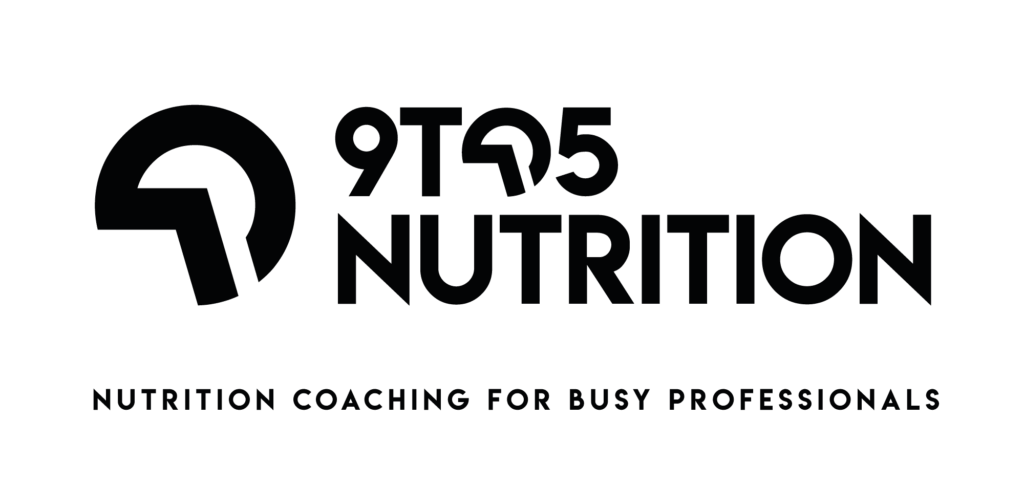

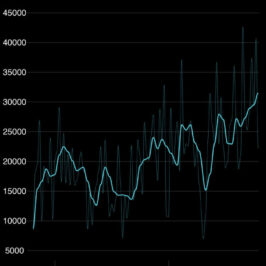

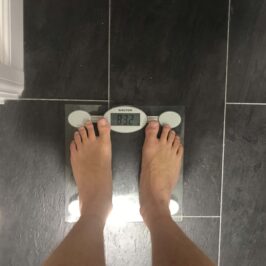
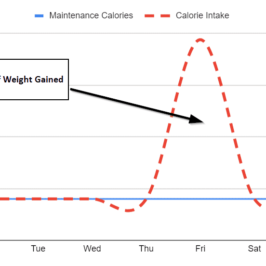
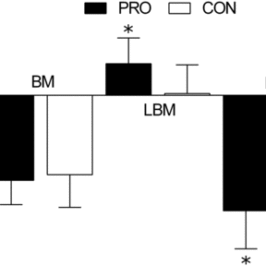
Leave a Reply